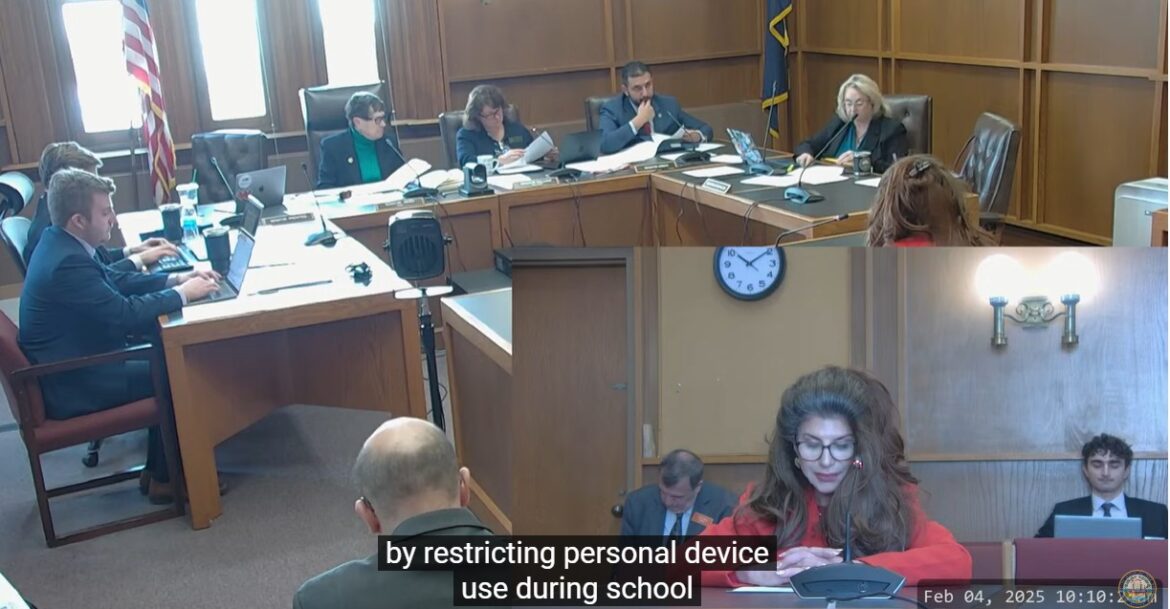By PAULA TRACY, InDepthNH.org
CONCORD – Cell phone usage could be curtailed in public classrooms in New Hampshire under a bill that went before the Senate Education Committee Tuesday.
It got support from the state’s two major teachers’ unions and the NH School Boards Association.
Senate Bill 206, sponsored by state Sen. Denise Ricciardi, R-Bedford https://gc.nh.gov/bill_status/billinfo.aspx?id=1046&inflect=2 would require school boards to develop and adopt policies which would prohibit personal use of the devices during the school day with exceptions for students with disabilities and multilingual students who may need them to benefit their education.
The policies would need to be updated annually and the bill would become law within 60 days of passage.
Gov. Kelly Ayotte said in her inauguration address that she supports such a measure.
Other supporters say such prohibitions have been successfully implemented elsewhere to help focus students on education in the classroom, saying that the phones pose a distraction to learning.
Introducing her bill, Sen. Ricciardi said she has been passionate about this issue for years and only decided to bring about this bill this year.
She said educational outcomes can improve and research shows smart phone use in class is distracting and leads to cyberbullying.
There are exceptions for various needs and the policies can be tailored to local needs, she added.
“You may have heard there are House bills to ban cell phones,” she said, indicating willingness to differentiate the other measures advancing in the lower chamber.
State Sen. Victoria Sullivan, R-Manchester, said she had concern for the word “prohibit” in the bill and there are incidents in which the devices are a safety tool.
Sen. Ruth Ward, chair of the committee, said she had attended a conference where there were companies that offer storage facilities for phones. There are, however, no funds attached to the bill.
Barrett M. Christina, executive director of the NH School Boards Association, said there is support for the concept. There are two bills in House Education which are exactly the same except one has $250,000 in it, he noted.
He said the School Boards Association is “not crazy” about the prohibition language and there might be times when students are not on academic tasks where they could use the phone.
Collaboration with parents “absolutely” makes sense, he said.
Christina noted that in 2006, a state policy was developed to prohibit pagers and beepers but revised to include cell phones.
He said he attended a conference with individuals who had cell phone restrictions in the past and reported that incidences of bullying went down, fewer physical altercations in the school were experienced, and thus better attendance, student achievement and performance.
Sullivan asked if there are districts that don’t have policies at all and he said he is not sure. Most high schools, he said, have some cell phone use policy.
He said the devices change over time and the name of the current policy “unauthorized communications devices” covers watches and other devices.
Sen. Daryl Abbas, R-Salem, a member of the committee, asked how to deal with communications during lockdowns.
Christina said the sample policy does not address that.
Deb Howes, president of the American Federation of Teachers NH said her organization supports the bill to allow for “distraction free learning.”
She said even elementary students carry phones now.
“The current system is not working,” she said. In some cases cell phone policy is left to the individual teacher.
You are setting up for a power struggle and these phones are addictive, she said.
“How much learning time are you using?” Howes asked to deal with those who fail to comply.
She said there should be exceptions and allowance for the district to work around the word “prohibit.”
Asked about enforcement, Sullivan said, noting her city in Manchester already has it but it is not always enforceable.
Howes said there should be support for the teacher.
“Do you have backup? Are there systems in place,” Howes said.
Sen. Ward asked if parents support cell phone bans and Howes said she has heard from parents who support the concept.
No parents spoke on the subject and there was no testimony in opposition.
Brian Hawkins of NEA-New Hampshire said his organization also supports the bill to improve the learning environment. This form of social media leads to cyberbullying and disrupts instructional time, he added.
This should not be left up to the individual educator, he said.
The state of Virginia was the first and at least 15 states have enacted statewide measures, he said.
Where cell phone bans exist in schools, it leads to a calmer climate in the school, “bell to bell,” he said.
Sen. Sullivan said there is a local control issue that she is struggling with, as well as the issue of compliance. Costs for a storage facility are not included in the bill as well, she said.
The committee ended the hearing without taking a vote on the bill.





